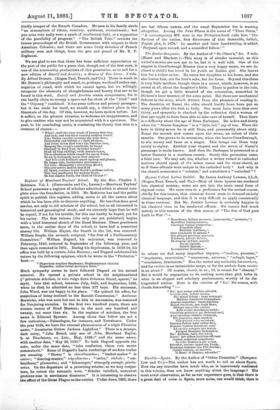We are glad to see that there has been sufficient
appreciation on the part of the public for a poem that, though not of the first rank, is one of the noteworthy productions of this generation, as to call for a new edition of Ranoll and Anzehia ; a Dream of Two Lives. 2 vols. By Alfred Domett. (Regan Paul, Trench, and Co.) There is much in Mr. Domett's philosophy and creed, or, perhaps, we should rather say, negation of creed, with which we cannot agree, but we willingly recognise the elements of thoughtfulness and beauty that are to be found in this work. Ranolf and Amohia wants compression, for it can hardly claim to occupy a space not far short of the " Iliad " and the " Odyssey " combined. It has some tedious and prosaic passages; bat it has made for itself, we should say, a distinct place in the literature of the day. Of this, however, we have spoken before. Let it suffice, on the present occasion, to welcome its reappearance, and to give readers who may not be acquainted with it a specimen. The poet, in his concluding canto, is combating the theory that man is a creature of chance:— "What shall the very winds of heaven that rise, And sink, and run their seeming reckless round, Like Tartar cavalry scouring the wide skies, Intractable and trackless ! shall all these, And every storm that tears the limitless seas, Olt:tenni tticteficxceedaili'lnpoTZ beolf=
Shall all that shifting, swift Aurora-dance, Those phantom revels round the secret Poles, Beset to God-made music that controls And bids each brilliant spasm up-leap and glance, By happy rule, harmonious governance ; Yet thin,—Humanity's abounding Mould, The ever-active matrix manifold Of Spirit, restless round Earth's millions rolled,
This vast machinery for making Souls,
Be but chaotic Force, the child of Chance ?"


































 Previous page
Previous page